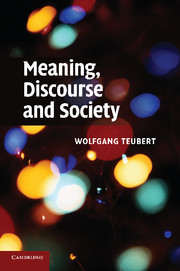Book contents
- Frontmatter
- Contents
- Acknowledgements
- Introduction
- Part I Meaning, the mind and the brain
- Part II Discourse and society
- 8 Language as discourse
- 9 Society presupposes language, and language presupposes society
- 10 A closer look at oral societies
- 11 Differences between oral and literate societies
- 12 Empirical linguistics deals only with recorded language
- 13 Meaning, knowledge and the construction of reality
- 14 The language of the scientific experimental report
- 15 Diachronicity, intertextuality and hermeneutics
- 16 Meaning and the interpretation of a haiku
- Conclusion
- Bibliography
- Index
13 - Meaning, knowledge and the construction of reality
Published online by Cambridge University Press: 04 August 2010
- Frontmatter
- Contents
- Acknowledgements
- Introduction
- Part I Meaning, the mind and the brain
- Part II Discourse and society
- 8 Language as discourse
- 9 Society presupposes language, and language presupposes society
- 10 A closer look at oral societies
- 11 Differences between oral and literate societies
- 12 Empirical linguistics deals only with recorded language
- 13 Meaning, knowledge and the construction of reality
- 14 The language of the scientific experimental report
- 15 Diachronicity, intertextuality and hermeneutics
- 16 Meaning and the interpretation of a haiku
- Conclusion
- Bibliography
- Index
Summary
Truth and meaning
It is my contention that discourse analysts can easily do without the discourse-external reality. The external reality and the reality constructed in the discourse are only related to each other indirectly, through primordial speech situations, largely outside of our investigative reach. It is true that if we read the sentence ‘There are many apples on the tree’, we can never be sure this sentence refers to a shared reality in which there were actually ‘real’ apples hanging on a ‘real’ tree. But to me it seems more important that the discourse tells us everything people have said about apples being on trees. Our ‘shared reality’ is not the reality out there. What we see there is not just stuff or matter; it is, to a large extent, an assembly of conceptualisations of concrete and abstract objects, properties, states, processes and actions that owe their existence to foregoing negotiations forming the residue of our memories. Without people discussing them, there would be neither apples nor pears. It is this realisation that makes me so suspicious of what is commonly called truth. If there is no link between the non-symbolic reality outside of the discourse, and the symbolic content of the discourse, how could truth be an issue? What we are concerned with is not whether Julianne's apple was truly delicious, but what it means if she calls it delicious. For me, the choice between truth and meaning is easy.
- Type
- Chapter
- Information
- Meaning, Discourse and Society , pp. 171 - 189Publisher: Cambridge University PressPrint publication year: 2010

